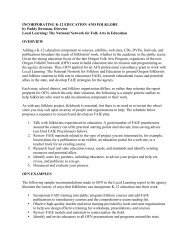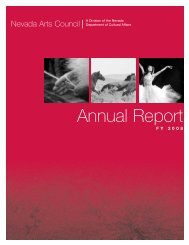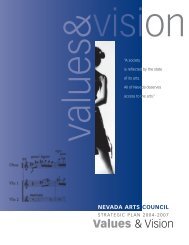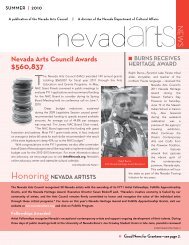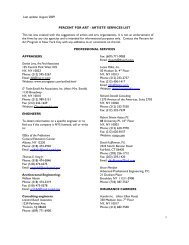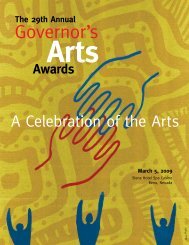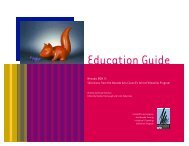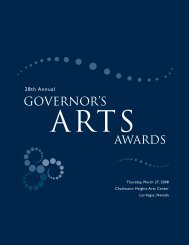Handed Down - Nevada Arts Council
Handed Down - Nevada Arts Council
Handed Down - Nevada Arts Council
Create successful ePaper yourself
Turn your PDF publications into a flip-book with our unique Google optimized e-Paper software.
1996–1997<br />
Scottish Bagpiping:<br />
John Massie and Wes Hallam<br />
In the hands of a master like John Massie of Las<br />
Vegas, the Scottish highland pipes can make a spirit<br />
soar, set feet to marching or dancing, lament the death of<br />
a loved one, or celebrate the joy of a marriage. For John,<br />
the technical execution of blowing and fingering is an<br />
important but partial element in learning the notoriously<br />
difficult pipes. The rest comes in understanding the<br />
history and meaning of the tunes, and expressing them<br />
deeply and individually. John’s apprentice Wes Hallam<br />
puts it this way: “He can communicate the feelings out. If<br />
he wants you to dance on the table he can communicate<br />
that feeling, you’re dancing on the table. If he wants<br />
The Las Vegas Pipe Band performing at the<br />
Las Vegas Folklife Festival.<br />
you to cry, you’ll cry, and if he wants you to believe that<br />
this is the best tune that you’ve ever heard he can even<br />
communicate that to you.”<br />
John retired to Las Vegas recently from Los Angeles,<br />
where he was the pipe major for the LA Police<br />
Pipe Band. He has spent over 50 years learning and<br />
perfecting the pipes, starting at age 12 when he began<br />
a six-year apprenticeship in his native Scotland. At age<br />
16 he passed the pipe-major’s exam at the College of<br />
Piping in Glasgow, and he’s been a pipe major every<br />
since. John is also a senior piping judge for solo and<br />
band competitions, and a tough and thorough teacher.<br />
“I believe in teaching to be complete,” he explains. “You<br />
should never just be able to pick up an instrument or a<br />
sheet of music and that’s as far as it goes. You should<br />
know something of the history of the music, where it<br />
came from, how to look after the pipe.” John had vowed<br />
to retire from teaching when he came to <strong>Nevada</strong>, but on<br />
his first visit with the struggling Las Vegas Pipe Band<br />
he couldn’t help making a few suggestions, and after<br />
that he couldn’t leave. “I could take that wee group out<br />
Wes Hallam and<br />
John Massie<br />
in a parade tomorrow<br />
and I would<br />
not be ashamed<br />
of them. “They’re<br />
working hard,” he<br />
says in his rolling<br />
brogue. They<br />
meet once a week,<br />
first playing tunes together on practice<br />
chanters so they can all play in unison<br />
(“in a competition unit, the pipe major is<br />
the law”) and then playing on the pipes<br />
and practicing their marching.<br />
John believes in training pipers for<br />
competition as a way to force them to<br />
improve, and he expected Wes to compete<br />
in the novice category after they had<br />
worked together for a year. They worked<br />
on all the traditional types of pipe tunes, including jigs,<br />
reels, strathspeys, hornpipes, waltzes, marches, airs and<br />
special tunes for weddings and funerals. When discussing<br />
his teaching style, John says, “I expect them<br />
to work, and if they do work, they’ll win. And I’m not<br />
nice when I demand something, believe me. I’ve calmed<br />
down since I retired, but I used to fall into the category<br />
of the Cursing Pipe Majors of Scotland. I know what<br />
I want off of you and there’s nothing in between.” His<br />
prize-winning students are proof that his style works.<br />
“When you see these kids coming back with gold medals<br />
and you listen to them play, you think, ah that’s the<br />
way it should be. That brings it back, it’s not too bad, I<br />
didn’t waste my time,” he concludes contentedly.<br />
47




